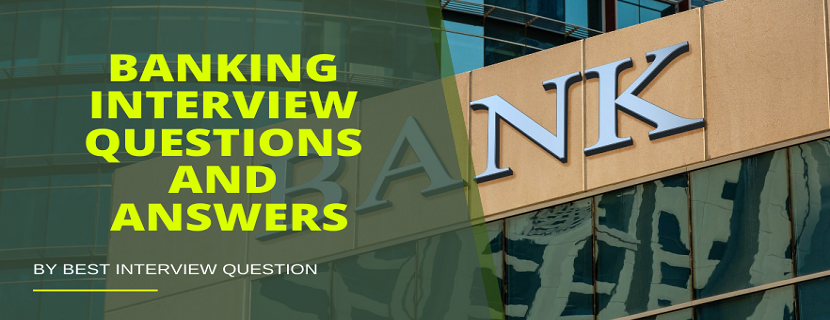Banking Interview Questions and Answers

Banking is an industry of money. Banking includes handling cash, financial transactions, credit and debits of the accounts, etc. In simple words, we can say that Banking is all about taking care of the money which is owned by individuals and entities. Our vast collection of Banking Interview Questions are the best resources for cracking your interviews.
Importance of Banking
- Banks provides several saving schemes which in return attract the people to save money.
- Provides secure money transactions all over the globe
- Provides loan to the agricultural sector at a very low-interest-rate that indirectly affects us.
- Generate employment for all the sectors of society
Most Frequently Asked Banking Interview Questions
The banking sector is regarded as one of the most respected and fastest growing industry. There is growth potential in this sector from the Trainee level to the general manager level, and the most important is this sector has job security.
Investment Banking is related to investments in the financial market. Investment Banking does the financial transactions or creates capital on behalf of the corporations, individuals and governments. Investment Banking also assists in mergers and acquisitions.
KYC stands to know your customer. KYC is a process by which the banks get the information about their customers, i.e. the identity and address. The KYC details are taken from the customer while opening the bank accounts. KYC is received from the customer to identify the theft, to Prevent money from going to the terrorist, Money laundering and Financial fraud
Cheque and Demand draft(DD) both are used to make the payments.
| S.no | Cheque | Demand Draft |
|---|---|---|
| 1. | It is issued by the customer | It is published by the bank |
| 2. | Payment is made after depositing the cheque | Demand draft is issued after giving the money to the bank |
| 3. | Signature is required in cheque | Signature is not required in DD |
| 4. | It can bounce | It cannot be dishonored |
Some of the functions of the RBI are:-
- RBI has a right to issue the currency notes except the One rupee note.
- RBI manages the banking requirements of the government.
- RBI supports banks with money in their financial crisis. This is called “lender of last resort.”
- RBI manages the Foreign Currency
ERi = Rf + βi (ERm- Rf)
Eri = Expected return of investment or security
Rf = Risk-free rate
βi = Beta of the investment or security
ERm = Expected return of the market
(ERm - Rf) = Market risk premium
Beta measures the risks in the stocks that have been invested. If a stock is riskier than the market, then the beta will be higher than one. If a stock has less risk, then the beta will be less than one.
Working capital or net working capital is the difference between a company’s current assets such as cash, customers’ unpaid bills, inventories and the companies current liabilities like accounts payable.
Working Capital = Current Assets - Current Liabilities
Money laundering is the method of generating an impression that the money which has been collected from drug trafficking, criminal activity is from the legal source.
CRR stands for cash reserve ratio, and SLR stands for statutory liquidity ratio. In CRR, some percentage of the total bank deposits must be kept in the current account with the RBI. The banks do not have permission to use that money for any commercial activity. Banks can’t use that money for investment purposes. Here, the banks don’t earn any interest on money.
In SLR, some percentage of the total bank deposits is invested in specific securities mainly the central government and the state government securities. Here the bank earns a certain amount of interest on their investment.
| S.no | APR | Interest Rate |
|---|---|---|
| 1. | It includes the interest rate and the other costs like the broker fees | It Includes the expenditure of borrowing the principal loan amount |
| 2. | Monthly payment is not based on Interest rate | Monthly payment is based on Interest rate and the principal balance amount |
Types of banking:-
- Retail Banking
- Business Banking
- Corporate Banking
- Private Banking
- Investment Banking
Retail Banking
Retail Banking is also called as Consumer Banking or Personal banking. Retail Banking service is provided by the bank for the general public and the small businesses. Retail banking includes personal loans, debit and credit cards, saving accounts, current accounts.
Business Banking
Business banking or Commercial Banking is the service which is provided by the bank for the middle-sized businesses. Business banking includes business loans, investment products, financial products which functions as a business for getting a profit.
Corporate Banking
Corporate Banking is also a business banking service which is provided by the bank for the large size business like Finance Institutions and corporates
Private Banking
Private Banking is the service provided by the bank to the HNWI (High Net-Worth Individuals). They are those individuals who hold financial assets with a value much more significant than 1 million US dollars. Private Banking services include wealth management strategies.
Investment Banking
Investment Banking is related to investments in the financial market. Investment Banking does the business transactions or creates capital on behalf of the corporations, individuals and governments.
The banking interview questions we are mentioning below will help you to gain enough of the knowledge of becoming an effective team leader.